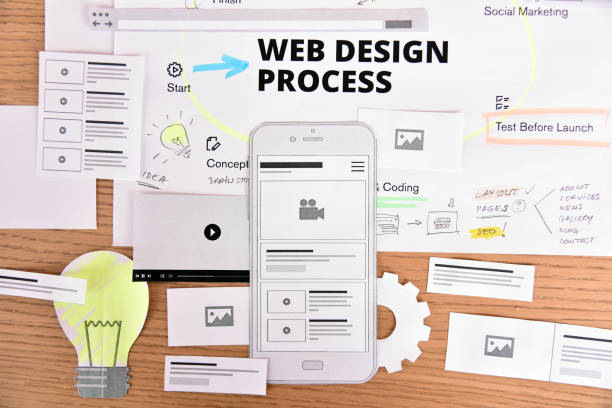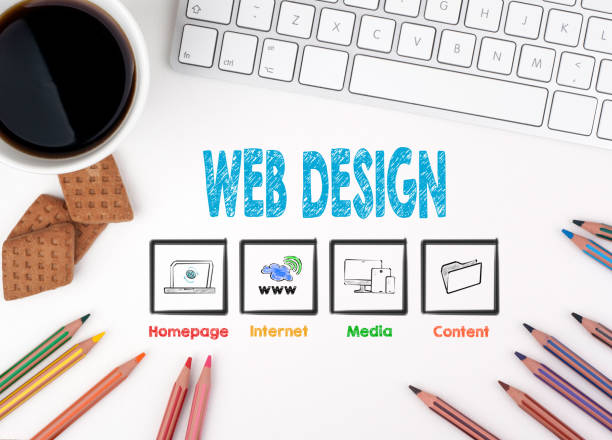Online business is a huge dimension in which countless websites exist organically. And the essence of these websites is that they compete for visitors’ attention. That’s why, in this dimension, there is one crucial question: how can just visitors become customers?
Actually, the answer is quite simple. It’s all about people being primarily attracted to the visual. Imagine you walk into a store and see a showcase of products. Is it true that you paid attention to the appearance of this showcase and its goods?
Of course! Similarly, we can say the same thing about any website. When potential customers visit your website, the first thing they see is the visual aesthetic. The design of your website will make your website visitor customer become a customer or vice versa.
Absolutely everything is essential in website design for potential clients. From intuitive navigation to compelling call-to-action buttons, absolutely every part affects the overall impression of your website. Therefore, we have prepared for you the 7 principles of design that will help guide just visitors to the status of a customer. Let’s not hesitate and find out what exactly will attract many real customers to you.
What Is Website Conversion: Definition And Examples
When discussing website conversion, it’s worth first understanding what it is. Website conversion is a rather complex process that will bring you and your customers satisfaction. To put it quite simply, it is the key to turning website visitors into satisfied, loyal customers.
It will be challenging for someone just starting in this field to understand. That is why it is worth offering real examples to help you objectively assess the situation. It is similar to how a customer in the store wants to buy something. And, on the site, it happens when a visitor does what you want them to do.
For example, imagine you have your own online store. It looks great, user-friendly, and generally great; potential customers like everything. Someone checks your site and buys something; that’s the conversion. Or, if a potential customer fills out a form to get more information, that’s a conversion, too. In general, it’s when visitors take actions that benefit your business.
There are many examples of what website conversion is. The bottom line of website conversion is when visitors take actions that benefit your business. Whether they make any online purchase or signing up for a consultation, or a newsletter. Each of these actions are positive and considered a conversion. It’s all about guiding people towards the action that you want them to do on your website.
Crafting High-Conversion Website Design: Strategies For Success

As we have already said, high-conversion web page design is paramount for businesses. Here, it is logically clear that it helps maximize the online presence. Therefore, any business must understand the right approach to succeed.
You must think through every element of the website as if making a proposal to your favorite girlfriend. And that is the only way you can develop and fight in this crowded world of websites. We have prepared for you the key strategies that you should consider when creating a website design that converts:
Clear Call-to-Action (CTA):
Incorporate prominent and compelling CTAs throughout the entire website. It’ll help guide the visitors towards desired actions such as purchasing, signing up for a newsletter, or requesting a demo.
Responsive Design:
Optimize your website for seamless viewing and experience on various devices. This improves accessibility and ease of use.
Streamlined Navigation:
Ensure the website navigation is intuitive and user-friendly. Visitors can easily find what they want without unnecessary clicks or confusion.
Engaging Visuals:
Utilize high-quality images, videos, and graphics to capture visitors’ attention. Also, it’ll help to communicate key messages effectively.
Social Proof:
Showcase testimonials, reviews, case studies, and endorsements. They’ll build trust and credibility with potential customers.
Optimized Loading Speed:
Minimize loading times to prevent user frustration and abandonment. Prioritize performance optimization for improved user experience.
A/B Testing:
Continuously experiment with design elements, layouts, and messaging. It’ll help to identify the most effective combinations for focusing on conversions.
Personalization:
Tailor content and offers based on visitor demographics, behavior, and preferences. It’ll help to create a more personalized and relevant experience.
Optimized Forms:
Simplify and streamline lead capture forms. Also, it minimizes friction and increases completion rates.
We recommend paying attention to absolutely every strategy of ideal conversion-centered design. It allows you to create the right website to attract potential customers. And that means that you’ll get the conversion you’ve been waiting for and celebrate the success of your business.
Unlocking The Power Of Conversion-Driven Design In Canada
Canada is a country where you can sing dithyrambs and say many nice words while relaxing on one of the beaches. But that’s not what we’re here for. And we see Canada as a big place with big business goals. Different companies are looking for innovative ways to stand out and make a difference.
We know the 7 web page design principles that will take your business to the next level. Utilizing these seven principles can have a significant impact on your prosperity. So, let’s get to grips with the approaches to create a visually appealing website:
Clarity:
Ensure your website’s messaging, layout, and navigation are straightforward and intuitive. It allows visitors to understand your offerings and take action quickly.
Consistency:
Maintain it in branding, design elements, and user experience across all website pages. It’ll help to build trust and reinforce your brand identity.
Hierarchy:
Establish a clear visual hierarchy that guides visitors’ attention towards essential elements. Among them are CTAs and critical messages, which facilitate decision-making and action.
Simplicity:
Embrace simplicity in design tips by eliminating unnecessary clutter and distractions. They are focusing on the essential elements that drive conversions.
Accessibility:
Rank accessibility in design. It’ll help ensure visitors can access and navigate your website effectively.
Emotion:
Infuse your web page with elements that evoke positive emotions and resonate with your target audience. They must foster connection and engagement.
Feedback:
Incorporate feedback mechanisms such as user surveys, analytics, and A/B testing. They’ll help to refine and continuously optimize your website for improved conversion rates.
By adhering to these principles, your company will surely unleash the power of conversion-centered design. This will help you achieve tangible results and stay ahead of your competitors, who are right on your heels.
So why don’t you rub their noses in it and increase leads and engagement with your brand? Hamilton Web Design specializes in creating high-converting web pages that combine aesthetics and functionality. We know how to achieve your business goals by focusing on conversion design. Together, we will unlock the full potential of your digital presence.
Choosing The Best Website Layout For Conversion
If you’re already set up for conversion, it’s not a big deal. You just need to pick the best website layout that will help you achieve the maximum conversion level.
As we said at the beginning, a properly designed website will increase the attractiveness of your potential customers. Accordingly, it will positively influence their behavior and attitude towards your brand. But, creating a quality website layout is not as easy as it seems at first glance. Here, you must understand the basic principles of design that will create visual novelty for your customers.
We have prepared the principles of design that we follow. And accordingly, you can consider them and create the perfect layout for your web page:
Balance:
Create visual balance by smoothly dispersing fragments across the layout. They promote a sense of stability and harmony.
Hierarchy:
Hierarchically organize content with essential elements given more prominence. It aims to guide users’ attention and facilitate navigation.
Emphasis:
Use contrast, color, size, and positioning to highlight critical elements. Among them are CTAs, product images, and unique selling points, drawing users’ attention to the most vital parts of the website.
Contrast:
Create visual appealing and differentiation by juxtaposing elements with varying characteristics. Among them are light versus dark, large versus small, or bold versus regular fonts.
Repetition:
Establish consistency across the website by repeating design elements. Among them are colors, fonts, and navigation styles to reinforce branding and improve usability.
Unity:
Ensure all layout elements work cohesively to convey a unified message. Again, they must reinforce the website’s overall purpose and identity.
These are the strategies that we recommend you to use during your work. They will help you achieve the perfect website layout for conversion, and you can defeat all competitors in this difficult field.
Conclusion: Use Design Tips Wisely
Remember that website conversion is more than simply looks and it’s also about directing visitors to do important activities. Understanding what website conversion is and using design concepts is critical. Applying design concepts strategically might help you build eye-catching layouts.
Read Also:
The post Design For Converting Website: Turn Visitors Into Customers appeared first on Social Media Magazine.

